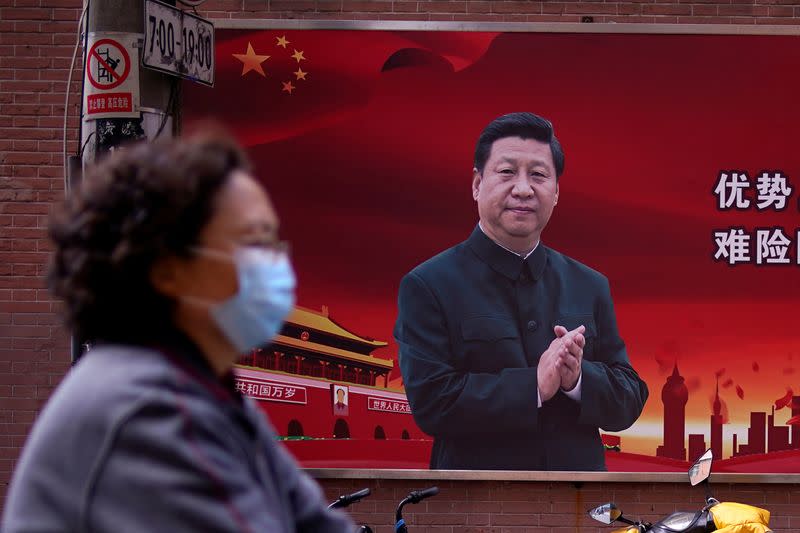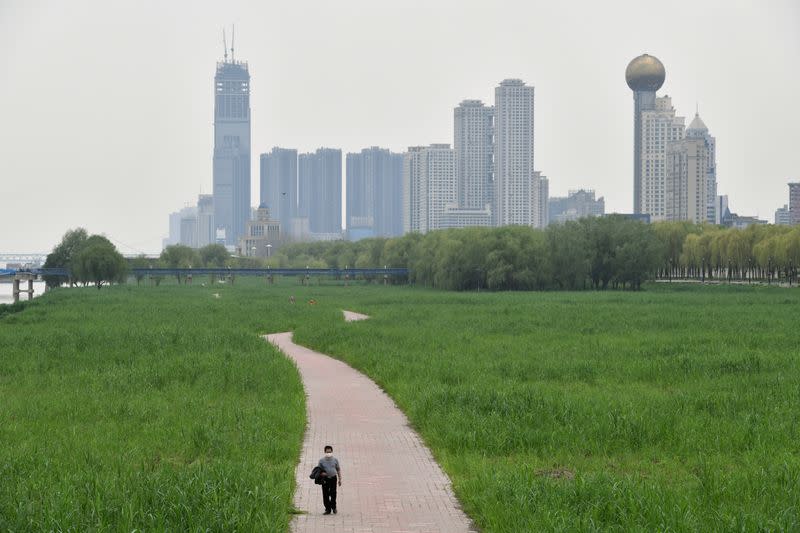China's Xi offers Trump help in coronavirus fight as Wuhan reopens to traffic
By Brenda Goh
WUHAN, China (Reuters) - Chinese President Xi Jinping told U.S. President Donald Trump on Friday that he would have China's support in fighting the coronavirus, as Wuhan, the Chinese city where the outbreak emerged, reopened to incoming traffic.
The United States now has the most coronavirus cases of any country, with nearly 85,000 infections. Hospitals in cities including New York and New Orleans are struggling to cope with the wave of patients.
Wuhan, where the virus is believed to have originated late last year in a seafood market and which had been on lockdown for more than two months, was open to incoming traffic late on Friday, although cars were not allowed to leave.
Hubei province, of which Wuhan is the capital, removed border restrictions on Wednesday for all but Wuhan, which will allow people to leave the city starting on April 8.
At a checkpoint entering the city on Friday night, three lanes were open to traffic but there were few cars, with a lone figure in military fatigues standing at each lane checking the mobile phone health codes of arriving passengers.
Along the highway entering the city of 11 million, blue and white signs pointed traffic to the now-closed Huoshenshan Hospital, which was built in eight days and opened in early February and came to symbolise China's aggressive management of the outbreak after a fumbled early effort.
Other evidence of the outbreak that devastated the city included posters dated Feb. 16 seeking volunteers to help battle the epidemic.
"Exits out of the city are still shut. We respectfully ask for your understanding," one road sign along the highway said.
Numerous people have been trapped inside and outside of Wuhan and Hubei and many of the cars entering the city had Wuhan number plates, indicating they were returning residents.
WAR OF WORDS
Xi's offer of assistance to the United States in a telephone call came amid a long-running war of words between Beijing and Washington over various issues including the coronavirus epidemic.
Trump and some U.S. officials have accused China of a lack of transparency on the virus, and Trump has at times called the coronavirus a "China virus" as it originated there, angering Beijing.
In the call, Xi reiterated to Trump that China had been open and transparent about the epidemic, according to an account of the conversation published by the Chinese foreign ministry.
Trump said on Twitter that he discussed the coronavirus outbreak "in great detail" with Xi.
"China has been through much & has developed a strong understanding of the virus," Trump said. "We are working closely together. Much respect!".
The World Health Organization has said the United States, which saw 17,099 new coronavirus cases and 281 deaths in the past 24 hours, is expected to become the epicentre of the pandemic.
CHINA CUTS FLIGHTS
Like U.S. hospitals now, China's medical system struggled to contain the coronavirus just two months ago, but draconian city lockdowns and severe travel restrictions have seen the epidemic ease.
Mainland China on Friday reported its first local coronavirus case in three days and 54 new imported cases, as Beijing ordered airlines to sharply cut international flights, for fear travellers could reignite the outbreak.
The 55 new cases detected on Thursday were down from 67 a day earlier, the National Health Commission said, taking the tally of infections to 81,340. China's death toll stood at 3,292 as of Thursday, up by five from a day earlier.
Hubei province, with a population of about 60 million, reported no new cases on Thursday, a day after lifting a lockdown and reopening its borders.
China's commercial capital of Shanghai reported the most new imported cases with 17, followed by 12 in the southern province of Guangdong and four each in the capital Beijing and the nearby city of Tianjin.
Shanghai now has 125 patients who arrived from overseas, including 46 from Britain and 27 from the United States.
In effect from Sunday, China has ordered its airlines to fly only one route to any country, on just one flight each week. Foreign airlines must comply with similar curbs on flights to China, although many had already halted services.
About 90% of current international flights into China will be suspended, cutting arrivals to 5,000 passengers a day, from 25,000, the civil aviation regulator said late on Thursday.
(Reporting by Se Young Lee, Lusha Zhang, Stella Qiu, David Stanway, Huizhong Wu, Colin Qian and Ryan Woo; Editing by Clarence Fernandez, Tony Munroe and Nick Macfie)




